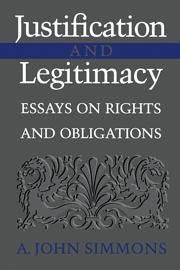Book contents
- Frontmatter
- Contents
- Introduction
- Acknowledgments
- 1 The Principle of Fair Play
- 2 Fair Play and Political Obligation: Twenty Years Later
- 3 The Obligations of Citizens and the Justification of Conscription
- 4 Associative Political Obligations
- 5 External Justifications and Institutional Roles
- 6 Philosophical Anarchism
- 7 Justification and Legitimacy
- 8 “Denisons” and “Aliens”: Locke's Problem of Political Consent
- 9 Human Rights and World Citizenship: The Universality of Human Rights in Kant and Locke
- 10 Original-Acquisition Justifications of Private Property
- 11 Historical Rights and Fair Shares
- 12 Makers' Rights
- Index
8 - “Denisons” and “Aliens”: Locke's Problem of Political Consent
Published online by Cambridge University Press: 05 June 2012
- Frontmatter
- Contents
- Introduction
- Acknowledgments
- 1 The Principle of Fair Play
- 2 Fair Play and Political Obligation: Twenty Years Later
- 3 The Obligations of Citizens and the Justification of Conscription
- 4 Associative Political Obligations
- 5 External Justifications and Institutional Roles
- 6 Philosophical Anarchism
- 7 Justification and Legitimacy
- 8 “Denisons” and “Aliens”: Locke's Problem of Political Consent
- 9 Human Rights and World Citizenship: The Universality of Human Rights in Kant and Locke
- 10 Original-Acquisition Justifications of Private Property
- 11 Historical Rights and Fair Shares
- 12 Makers' Rights
- Index
Summary
John Locke claims at the beginning of Chapter 8 of his Second Treatise of Government that “the only way” one can lose one's natural liberty and be “subjected to the political power of another” is by giving one's “own consent” to enter a body politic (Second Treatise, section 95; subsequent references by section number only). As every student of Locke's political philosophy knows, however, by the close of Chapter 8 this apparently simple consent theory of political obligation and authority has been considerably complicated. In particular, Locke's use of the concept of tacit consent (at the end of Chapter 8) raises a host of difficulties for his – and for any – consent theory. It is with some of these difficulties that I will be concerned in this paper.
Locke's motivation in drawing his well-known distinction between express consent and tacit consent initially seems plain. If only our own consent can subject us to and obligate us to obey a political authority, and if (as seems to be the case) very few people in actual political societies have done anything that looks much like a declaration of political consent, then we seem to face the disturbing conclusion that few residents of real political societies are bound to obey their political authorities and the laws that issue from them. Locke's avowed purpose in the Treatises, however, is precisely to “make good” the new King William's “title, in the consent of the people” (Preface; my emphasis).
- Type
- Chapter
- Information
- Justification and LegitimacyEssays on Rights and Obligations, pp. 158 - 178Publisher: Cambridge University PressPrint publication year: 2000



